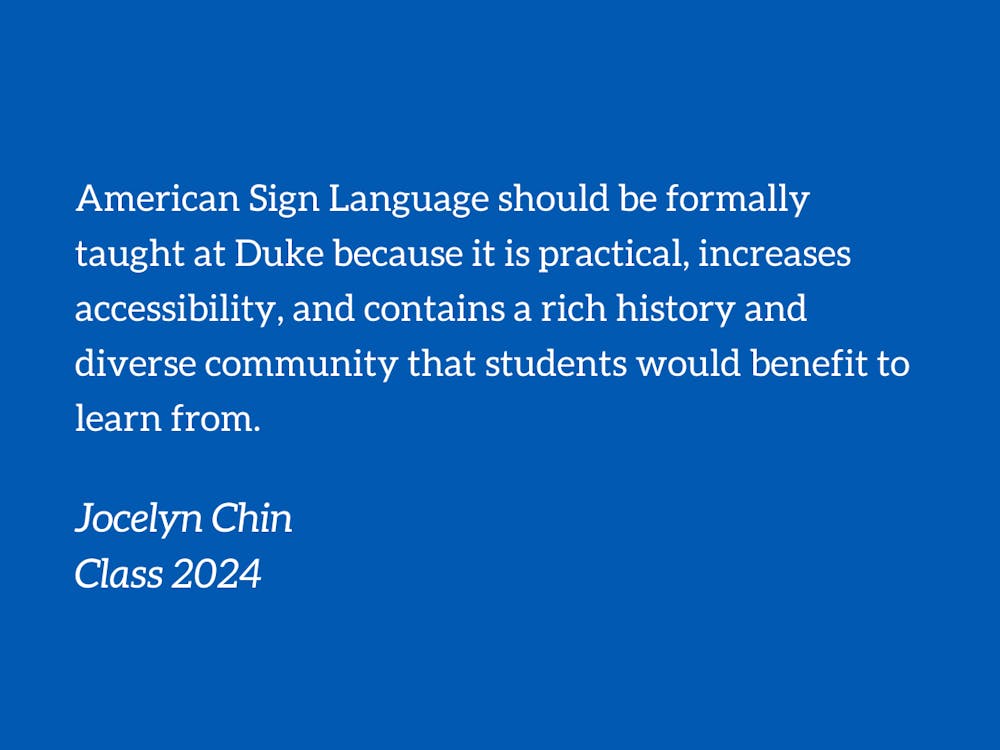On Tuesday evenings, I sit in a classroom with twenty-some students and a librarian. While we chat, the room remains quiet. Our hands say: how are you? Exhausted. (Two clenched fists, releasing outwards with an exhale as the shoulders slump). Last week, a classmate shared that they saw an alligator eat a chihuahua down the street. Jaw drop! They explain: I live in Florida.
This ASL & Deaf Studies house course is limited to 18 students, but an extra handful show up weekly out of interest. Emma Runia ‘23, former president of ASL Club, and Lily Elman ‘23 co-teach this course. Thanks to them, this is the first semester students are receiving credit for learning ASL. Unfortunately, due to the unresponsiveness of the administration and Trinity Language Council, it may also be the last.
American Sign Language should be formally taught at Duke because it is practical, increases accessibility, and contains a rich history and diverse community that students would benefit to learn from. Languages are inherently tied to cultures, values, and identities. If Duke’s curriculum continues to neglect ASL, whose stories are we missing?
More than 10 million Americans are deaf or hard of hearing. Half a million Americans use ASL as their native language. An increasing number of universities comparable to Duke offer ASL classes, e.g. Stanford, Cornell, Yale, Brown… and UVA and UPenn established ASL and Deaf Studies minors. Linguistic scholarship on signed languages (in addition to spoken) broadens our view of what language is and how it can or should be taught.
Moreover, teaching students to sign can make campus more accessible for d/Deaf family and friends, for Durham’s d/Deaf community, and for people with limited oral communication from developmental disabilities. Advocating for ASL also initiates dialogue regarding disability. Even within the Deaf community, individuals disagree on whether d/Deaf people are disabled. This incongruity may arise due to two contrasting models of disability. The medical model says people are disabled by impairments; the social model says disability is caused by how society operates (our normative catering towards hearing people creates barriers that disadvantage, restrict, and thus disable the deaf population).
As Elman explained: “If people understand sign language, then deafness isn’t necessarily a disability. [Signing] prevents this social barrier. There are very few social barriers that individuals can work to change, but this is one of them. I can make… spaces accessible for the d/Deaf by [learning ASL].”
While Duke has taken steps to raise awareness surrounding ASL, their commitment to disabled students and the Deaf community falls short. The language department demonstrated its commitment to accessibility when they altered foreign language requirements for students with disabilities. However, accommodations like this often benefit wealthy students who can afford diagnoses. The language council should consider which minority students remain left out.
Earlier this year, Runia and Elman presented why ASL should be a language class to Duke’s Trinity Language Council. The council suggested an ASL Awareness Week, which included a sign-in on Abele Quad, speaker event, and screenings of CODA and Signing Black in America. Duke then advertised ASL Awareness Week on Duke Today and Instagram, where one commenter applauded: “nice job Duke university proud of you for giving asl class.”
Runia and Elman express indignance towards the comment since Duke was in fact not offering ASL class; the point of Awareness Week was to advocate for classes. “ASL week was exciting and it was nice to have support from some faculty, but it… felt like [Duke was] taking advantage of our passion,” Runia explains.
Alum Julie Walkup ‘90 reached out to Runia after seeing the Awareness Week posts. At Duke she had started an ASL club, hosted silent dinners, and advocated for classes. Three decades later, we’re in the same place; support from Duke’s administration and language council remains lackluster. Runia says, “we are still trying to figure out who to talk to. Duke admin is changing a lot… It’s confusing because people you build relationships with, people who tell you things like ‘ASL is coming,’ move and are not here anymore.”
Duke has a reputation in the community of not being d/Deaf friendly. We need to create a space that listens to and understands them. Teaching ASL affects not only students but sends a message beyond Duke. Classes taught, professors hired, and programs that receive funding reflect who schools care about. I want to see non-performative change in our curriculum, creating a space where the Deaf community and ASL speakers are openly welcome.
Jocelyn Chin is a Trinity junior and an opinion managing editor of the Chronicle's 118th volume.
Get The Chronicle straight to your inbox
Signup for our weekly newsletter. Cancel at any time.
Jocelyn Chin is a Trinity junior and an opinion managing editor of The Chronicle's 118th volume.

